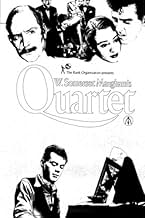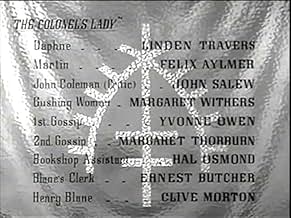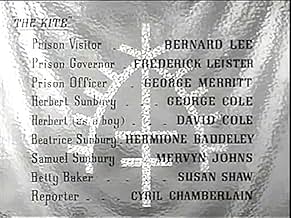Four of W. Somerset Maugham's short stories are brought to the screen with each introduced by the author. In "The Facts of Life", a young man with great potential on the tennis courts goes t... Read allFour of W. Somerset Maugham's short stories are brought to the screen with each introduced by the author. In "The Facts of Life", a young man with great potential on the tennis courts goes to Monte Carlo and ends up doing the exact opposite of what his father recommended. In "The... Read allFour of W. Somerset Maugham's short stories are brought to the screen with each introduced by the author. In "The Facts of Life", a young man with great potential on the tennis courts goes to Monte Carlo and ends up doing the exact opposite of what his father recommended. In "The Alien Corn", an aspiring pianist devotes himself to perfecting his artistic skills, but f... Read all
- Awards
- 2 wins total
Featured reviews
A set of four half-hour movies built on stories by Somerset Maugham, who also introduces the movie. They all have a witty naturalism that's totally likable, and the slice of life insights are sometimes even moving. You can only get so far into complexity in a short time, but these do well at packing their narrative efficiently. Really enjoyable. And, especially for those of us who aren't British, they are a total insight into British life (mostly upper class British life, for sure, and mostly post-war era).
It's hard to go into them all in detail but I'll point out the key thing to each that makes them watchable. I'm not talking plot, but some other quality. As follows.
The Facts of Life: The most fun might be the first, logically placed. A man is given advice by his father before going to Monte Carlo (that rich person's den of temptation). And things go exactly backwards, without the son really having a thing to do with it. You mostly smile and enjoy the ride.
The Alien Corn: More straightforward (except the title), and reveals a common Maugham theme of getting the practical British old folks to appreciate an artist's sensibility. In this case it's music. And it runs into a shocking final chord. Idealism up against the wall.
The Kite: Really a tale of a marriage that comes unhinged on one basic misunderstanding. Both main characters (man and wife) are stubborn about certain principles, and it comes to a rather simple kind of violence between them. And a resolution. Touching.
The Colonel's Lady: Certainly more touching, a funny and brilliant and sad bit of writing and stunning acting. This is probably the most involved of the group, and it's just tightly made, a short story in feel, and yet with enough layers to make it really lasting.
All of these are about real life and real people, and small things that end up mattering quite a lot. It's a different experience than a single feature movie, yes, but a refreshing one, with built in refreshment breaks. If you like this approach (sort movies in group), check out the Maugham inspired sequel of sorts called "Encore."
===== THE FACTS OF LIFE (directed by Ralph Smart) is one of the most entertaining stories of the four, with both an interesting story process and a surprise ending. Here, we have a father giving his son three precepts before sending him 'out into the world' on his own. 'The world,' here, is short-term trip to a tennis match in the South of France . The son breaks all three precepts and still succeeds in spite of breaking his father's rules. The aggravating part for the father is that it makes a fool of him at his club. This is like the Polonius– Laertes relationship turned on its head. The consequences aren't great enough to be that important, and one can't help but feel that Maugham is doing a spoof on the superficiality of the upper-class Club set. (8/10)
===== THE ALIEN CORN (directed by Harold French) This story, starring Dirk Bogarde and Honor Blackman, left me cold. Not only is it uninteresting, but the ending is telescoped almost from the outset. Also, it is hard to believe that Honor Blackman's character might not have guessed that anyone who would rather study piano for two years than show ANY interest in her at all either has a hormone deficiency or she just plain doesn't turn him on. One wants to cry out, 'Honor, can't you take a HINT!!' This guy is NOT the marrying kind. Too bad the people in those days couldn't just ask, 'Are you gay? OR 'Do you love me at all?' before emotionally investing in a two-year experiment, leading nowhere. (3/10)
===== THE KITE (directed by Arthur Crabtree) was fun because of the English humor; the story about a boy growing up with the unusual hobby of kite flying; and the fact that his parents not only encouraged him to look no further than his hobby but TOTALLY join him in his one and only passion. To most parents, it is OK to have a hobby but not to the exclusion of a social life. I loved the competition interaction between the possessive kite-flyer's mother (Hermione Baddeley) and her son's fiancée, and later wife, Betty (Susan Shaw). Though this story ends in a somewhat conventional way, the process is where the fun comes into play. (7/10)
===== THE COLONEL'S LADY (directed by Ken Annakin) is probably the best of the bunch. Here, we have an extremely important man, doing his extremely important work, and giving little attention to his wife. When she publishes a book of poetry, under her maiden name and gets paid for it, he is mildly annoyed. When he learns from everyone everywhere that her poetry is not only great by that it is salacious, he becomes VERY annoyed. But, worst of all, he finds out from his mistress that the author's poetry about her affair with a younger man is so realistic that it could only be true. After 'the light bulb finally lights up' in this very important man's head, he is SO annoyed that he actually reads the book himself!! This story is great, both for the way it unfolds and the way it ends. (10/10)
W. Somerset Maugham was one of Great Britain's last great, subtle story tellers, a master of the ironic and quiet wisdom. Late in a long career he had substantial success with three films tied to successful books of his classic short stories - of which QUARTET was the first. In it, Maugham provided an introduction to the collection and a brief exegesis or afterward. In the subsequent films, TRIO (1950) and ENCORE (1951), the film makers improved the experience by having Maugham provide a brief introduction to each of the three stories - reduced from QUARTET's four.
The four works dramatized in QUARTET are given perfect, polished productions with appropriate stars of the British stage and screen, only a few of which will be familiar to American eyes - most notably Dirk Bogarde as the hopeful pianist in the strangely undercut (by the screenwriter's removing Maugham's ethnic subtext) "Alien Corn," the movie's second act, and Honor Blackman as his girlfriend. The stories themselves are quiet, literate and well worthwhile, but hardly the sort of thing to set the pulse racing. More the sort of thing to set the MIND racing. They well reflect the sort of sensibility, such as which Maugham brought to his best plays like THE CONSTANT WIFE, THE CIRCLE or THE LETTER.
Maugham's three anthologies were successful enough that a decade later his works were again tapped for a successful three year run of an hour long television anthology ("The Somerset Maugham Hour") in which all four of these stories would be recycled along with several of those from the film sequels.
Hard to find at present in the U.S. aside from occasional screenings on cable services like Turner Classic Movies, the films have been reissued on British DVDs and are well worth seeking out for good, literate viewing. Some of these four (the concluding "Colonel's Lady" in which a Col. Blimp-type, startled to find his wife of many years has written a best selling book of poetry recalling a great love affair is consumed with jealousy for the unknown lover) are legitimate classics, some ("Alien Corn" in which 'reasonable' solutions to personal passion are found wanting or "The Kite" in which a young wife nearly destroys her marriage through a conventional concern with her own image and refusal to understand her husband's passion) have been copied so frequently they risk feeling almost trite and some ("The Facts of Life" in which a young man finds his father's advice not infallible) are so quietly humorous that it is easy to miss Maugham's more serious point, but all are quiet gems, polished to a nice soft glow.
The Entire Maugham trilogy (QUARTET, TRIO and ENCORE) is well worth your time if you don't need car chases and explosions to hold your interest.
1948's 'Quartet' is the first of this particular trilogy, the other two being 1950's 'Trio' and 1951's 'Encore'. It is not an even film all the way through (anthology films seldom are, in a number of the numerous ones seen there is at least one segment that doesn't work as well as the others), but it is very good with not an awful lot to criticise as an overall whole. Of the three films, 'Quartet' is perhaps the best, though all three are worthwhile and more in their own right. Found a lot to like about all four segments, named "The Facts of Life", "The Alien Corn", "The Kite" and "The Colonel's Lady".
As said, there is not an awful lot wrong at all. For my tastes, "The Kite" ended slightly anti-climactically and "The Alien Corn", while still well done in its own way, beautifully acted, insightful and quite touching, has a different, darker tone than the rest of the lighter, more subtle stories and it slightly jarred in comparison.
There is an awful lot to like in 'Quartet'. Will agree with those saying that "The Colonel's Lady" is the best of the four, found it very insightful, beautifully subtle and very moving, the ending being an especially poignant touch. Loved the twists at the end of each segments, the most surprising being the one for "The Alien Corn", and the thoughtful hosting of W Somerset Maugham himself. 'Journey's End's' RC Sheriff adapts the stories with intelligence, refreshing lightness and respect for Maugham's writing, with a nice mix of emotion, thought-provoking subtlety ("The Facts of Life" being the most subtle and gentle perhaps), real insight into the subject matter, charm and offbeat amusement ("The Kite" particularly).
'Quartet' is beautifully filmed and directed, especially in "The Colonel's Lady", as well as evocatively scored throughout. The cast range from good to brilliant, with the best performance coming from Cecil Parker. It was interesting to see a pre-stardom Dirk Bogarde and he is also very good, as is Honor Blackman
Concluding, very well done. Worth seeing for especially "The Colonel's Lady", which gets my personal vote of the best segments of all three films in the trilogy. 8/10 Bethany Cox
Did you know
- TriviaThe symbol on the title page of each story is a W. Somerset Maugham superstition. Copied by his father on a trip to Africa, it is a Moorish symbol to bring good luck and ward off the evil eye. Maugham had it printed in his fourth novel, but unfortunately upside-down and the book flopped. Printed correctly on subsequent books, he became a best-selling author and had the motif reproduced everywhere, including his Riviera house, Villa La Mauresque.
- Quotes
W. Somerset Maugham - Host: In my twenties, the critics said I was brutal. In my thirties, they said I was flippant; in my forties, they said I was cynical; in my fifties they said I was competent - and then, in my sixties, they said I was superficial.
- ConnectionsFeatured in Raiders of the Lost Archive: Episode #1.3 (2009)
- SoundtracksAlouette
(uncredited)
French Canadian Traditional
Sung by all in the Cabaret room in "Facts of Life" segment
- How long is Quartet?Powered by Alexa
Details
- Release date
- Country of origin
- Language
- Also known as
- Quartett
- Filming locations
- Gainsborough Studios, Islington, London, England, UK(studio: made at Gainsborough Studios, London, England.)
- Production company
- See more company credits at IMDbPro
- Runtime2 hours
- Color
- Aspect ratio
- 1.37 : 1
Contribute to this page



































